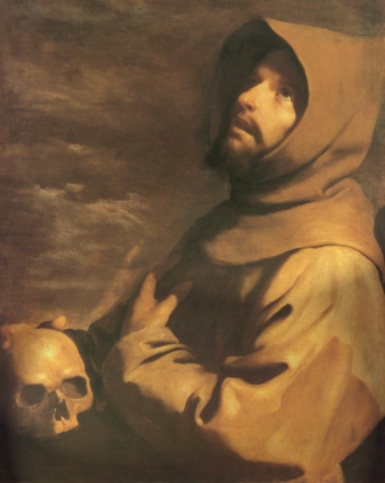At a certain time when
Francis began to have friars, dwelling with them at Rivo Torto near Assisi, one of the friars,
in the middle of the night, began crying out, “I am dying! I am dying!”
All the brothers woke up amazed and frightened. The holy Father rising, said, “Rise,
brothers, and kindle the light!” And
when it was lit, he said, “Who is he that said, ‘I am dying’?” The brother answered, “It was I.” And he said to him, “What is the matter,
brother? How do you die?” And he said, “I die of hunger.”
And the Father caused the
table to be laid right away and like a man full of charity and discretion, ate
with him lest he should be put to shame by eating alone, and by his will, all
the other friars ate as well. For that
brother and all the other friars who had newly turned to the Lord, used to
inflict their bodies beyond measure.
And after the meal the holy
Father said to the other friars, “Dearest, I bid you, each of you, consider his
nature because though one of you may be able to sustain himself on less food,
yet I will that another who requires more food shall not be bound to imitate
the first in this thing, but shall, considering his own nature, give his body
what it requires, so that it may be able to serve the spirit. For as we are bound to beware of superfluity
of eating, which harms body and soul, so also must we beware of too great
abstinence—nay, even more—since the Lord will have mercy and not
sacrifice.” And he said, “Dearest
brothers, this which I have done, to wit, that on account of charity towards my
brother, we have eaten together with him, lest he should be ashamed to eat
alone, necessity and charity rather forced me to do. But I say to you that I would not do so
again, seeing it would be neither religious nor becoming. But I will and command you that each of our
brothers according to our poverty satisfy his body as it shall be necessary for
him.” For the first friars and the
others who came after them for a long time, afflicted their bodies beyond
measure with abstinence from food and drink, with vigils, with cold, with
roughness of raiment and the labor of their hands; they wore next their flesh
very strong iron belts and cats and hair shirts; on which account, seeing by
occasion of this the friars might become weak and that some were already in
that short time ill, he forbade in a certain chapter any friar to wear anything
next the skin except a tunic.
But we who were with him bear testimony of him, that
though in the whole time of his life he was thus discreet and temperate
concerning his brothers, yet it was so that they should at no time deviate from
the way of poverty and the decorum of our Order. Nevertheless, the most holy Father himself
from the beginning of his conversion unto the end of his life, was austere to
his own body, although he was by nature feeble and could not have lived in the world,
except delicately. So, considering on a
certain day, that the friars were exceeding the measure of poverty and of
decency in their food and in other things, in a certain sermon which he made to
sundry brothers, in the presence of all the friars he said, “Let not the
brothers think that some allowance is necessary to my body, for because it behooves
me to be the form and example of all friars, I wish to use and be content with
few and very wretched meats and to use all other things according to poverty
and utterly to turn in disgust from things rare and delicate.”
-Mirror of Perfection Section III, Chapter 27
Francis, even along with Benedict, recognizes that the
austere seem, at times, to put a tremendous burden on the weak. Indeed, this was one of the main concerns of
church leadership about the early Franciscan order. What we all must realize is that everyone is
at a different level. Some have the
ability to closely follow the way of Francis.
Others will never follow that way.
The Lord has given us different starting places, and different places to
finish. Not all will be able to pray for
hours a day; not all will be scholars of the Bible; not all will sacrifice
their lives for Jesus; not all can endure the weight of the need of the
world. Those who can, should accept it,
but those who cannot should not feel guilty.
Each of us is given a burden from the Lord, and that burden is
sufficient. Let no one add to it, and
let us not feel overburdened to add to it ourselves.
Jesus himself warned us: "Whoever causes one of these little ones who believe to stumble, it would be better for him if, with a heavy millstone hung around his neck, he had been cast into the sea." (Mark 9:42) Paul also encouraged us: "We who are strong ought to bear the weaknesses of those without strength and not just please ourselves." (Romans 15:1) We need to accept and encourage our weak sisters and brothers, not condemn them or reject them.

















